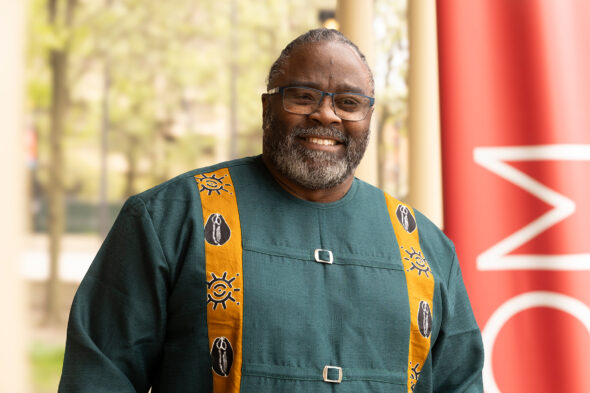Inspiring Grad: Thomas Morris

Thomas Morris has worked in IT for more than 25 years, learning new skills as the industry underwent continual change. But even during those years, the example his community-minded father, a pastor, set for him and his sisters; his difficulty in finding a compatible therapist during the COVID-19 pandemic; and, especially, his experience as a dad led him to search for more purpose.
Trying to explain the deaths of Trayvon Martin and, later, George Floyd to his young son — and to himself — was what truly galvanized him to return to school in 2020, Morris said. On May 3, he’ll graduate from UIC with a master’s degree in social work and a goal: to make a positive impact in the lives of Black men.
Morris remembered struggling to explain to his son in 2012 how Martin, a Florida teen, was killed in an altercation with a Florida man, George Zimmerman. When his then 5-year-old son asked, “‘Is he going to come do something to me?’” Morris was perplexed about how to answer.
“How can I best teach him how this world really works in a way that will not terrorize him but at the same time allow him to maintain his own dignity, his own idea and concept of self?” Morris remembers asking himself.
Floyd’s death in 2020 left Morris with his own despair. It wasn’t easy to find a therapist he felt could understand him and his life experience.
“Mental health services is, in my opinion, desperately needed in the African American community,” Morris said. “And for the most part, in so many ways, quality mental health care is considered a luxury in our community.”
With a master’s degree in social work Morris wants to help Black men, in particular, find the mental health care and social support that greatly benefited him. He’ll begin work on his PhD in the field this fall, also at UIC.
During an internship with the Chicago human services agency Habilitative Systems Inc., Morris testified before the Joint Behavioral Health Committees of the Illinois House and Senate on the need for more mental-health services for Black men. He leads men’s groups at his church to support those in his community and keep his counseling skills sharp. At UIC, he’s a leader in We Are Men, the organization he credits with supporting him at a crucial time. Members of the group volunteer in the community and encourage each other as they work toward their master’s degrees in social work.
“It was an anchor for me,” Morris said about We Are Men. Having a space where he could talk with someone who understood the difficulty he might face trying to complete this part of his education while also working and raising a son, all while confronting the struggles of navigating society as a Black person, he said, “the value of that is immeasurable.”
Creasie Finney Hairston, dean of the Jane Addams School of Social Work, created We Are Men with professor Marvin Lindsey about five years ago. They hoped to support enrollment and graduation rates for Black men earning master’s degrees in social work and to answer a desire from community social-work agencies to hire Black men with advanced degrees. Morris, a member throughout his graduate studies, has become a leader to other members, Lindsey said.
“I just admire his dedication,” Lindsey said. “He’s just a special guy who’s really prepared to have a huge impact in our industry, in our community, with other families and students. He’s going to be amazing.”
In We Are Men, Morris said he found others who shared his goal of meeting the social support and mental health needs of their community.
“My value is intrinsic,” Morris said. “That understanding, I believe, is the foundation to mental health overall. Particularly within the African American community, we are constantly bombarded with messages that try to tell us differently. And so my interest, why mental health is a focus for me now, is to help change that specific narrative.”
